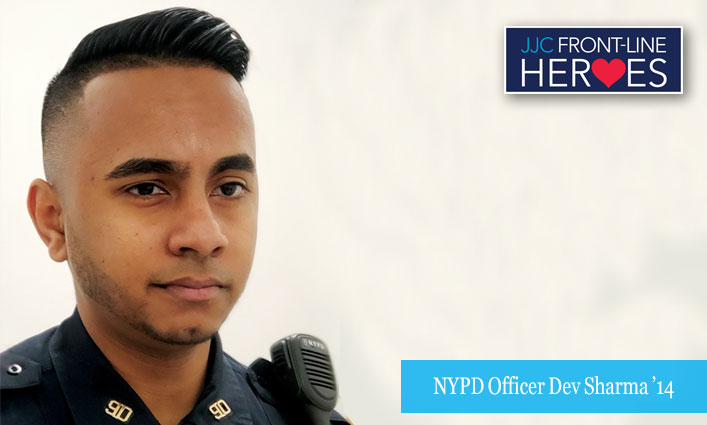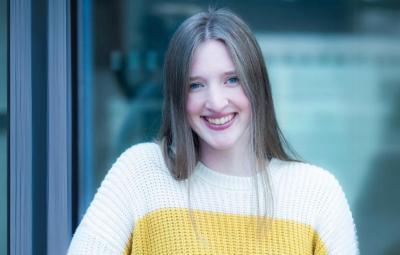
New York City is at the epicenter of the Covid-19 health crisis, and as a New York City-based College that educates students committed to public service, our alumni, students, faculty, and staff are working on the front lines to keep our communities safe. Our “Front-Line Heroes” article series serves as a testament to the valiant efforts of our first responders and essential workers. As a community we thank them for their service, dedication, and personal sacrifice.
“My precinct's day shifts were hit pretty hard at one point. Luckily, we have a lot of our officers recovering and coming back to work.” —Dev Sharma
By mid-March, Dev Sharma ’14, a New York City Police Department (NYPD) officer, started to see the initial impact of Covid-19 because, “a lot of officers that I knew were unfortunately getting sick. Then we really started to see a difference in how we addressed the issue,” says Sharma. “Now, on a typical day, everybody’s masked and gloved up at the beginning of our shifts. We’re practicing social distancing whenever we can. We’re even holding our roll calls outside of the precinct. That way everybody can space out, and the sergeants can address a wider area of people.” Sharma says that he’s carrying sanitizing products in his car and is routinely spraying down every surface on the inside and outside of the car.
On the Job
Sharma explained that he’s been getting a higher number of calls since the epidemic started affecting New York City. “There’s been a lot of calls where the person is unfortunately not breathing, or they’re dead, which is hard,” he says. “And now, with the new protocols in place, if there’s a confirmed DOA [dead on arrival], or if it’s confirmed that the person has not been breathing for an hour, there’s nothing we can do, and we are not allowed to approach the apartment. We have to wait for EMS [Emergency Medical Services] to get there.” Before Covid-19, Sharma and his partner would enter the dwelling and investigate, but now, because of the risk of exposure, their tactics have changed. “When 15 percent of your manpower has been hit with this disease, you have to change the way you do business. There are a lot of people that depend on us, and my precinct’s day shifts were hit pretty hard at one point. Luckily, we have a lot of our officers recovering and coming back to work.”
“Everyone, from the people driving our buses, to the good people cleaning our precinct and minimizing our risk of exposure, deserves recognition.” —Dev Sharma
On His Mind
When it comes to the emotional distress that Covid-19 is taking on front-line workers, Sharma says that his mind often goes to his grandparents, who happen to live with him and his mom. “I’m doubly worried about them because this disease attacks the elderly even harder,” he says. “When I come home, I take off all of my stuff downstairs. Then, I run upstairs, shower, and then say hello to everybody. I try not to take the stress home, but honestly, just seeing the sheer amount of people getting sick, whether it’s your coworker, or these innocent people that we encounter passing away, the impact can get to you.” One of the toughest moments for Sharma was when a coworker lost his mother to the disease. “I literally see this guy every day. He’s one of us. He’s a family member. Watching someone so close to me struggle with a devastating loss, that really hit home for me.”
When Sharma talks about his mother, an essential worker who is employed at a shipping company, he notes that both of them are concerned about bringing the virus home. “We’ve both been taking as many precautions as we can around coming home, but exposure still weighs on our minds.” For Sharma, his mother’s work is just as important as his own, and deserves its own recognition. “Everyone, from the people driving our buses, to the good people cleaning our precinct and minimizing our risk of exposure, deserves recognition.”
“This is a real pandemic affecting a lot of people. Please stay home when you can, and know that we’re doing the best that we can to keep you safe.” —Dev Sharma
On the Community
Sharma works in Williamsburg, Brooklyn, and he’s tremendously thankful for the support the community has shown his precinct during these challenging times. “The folks in Williamsburg have been amazing. They’re stopping by and donating stuff. When we walk by them, they say, ‘thank you for being out there.’ Little kids on the streets wearing masks are giving us salutes when they see us. We appreciate all of this because unfortunately, crime doesn’t sleep, not even during a pandemic,” says Sharma. As for his advice for the community at large, he hopes that everyone calmly bears with the situation, while also taking the spread of the disease seriously. “This virus is not a trick or a hoax. This is a real pandemic affecting a lot of people. Please stay home when you can, and know that we’re doing the best that we can to keep you safe.”



